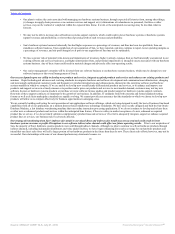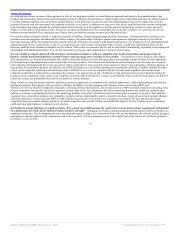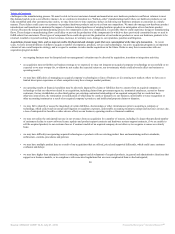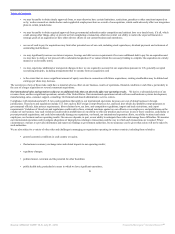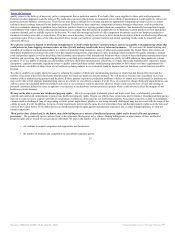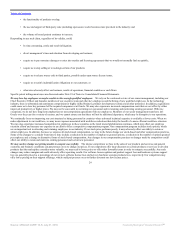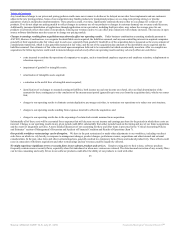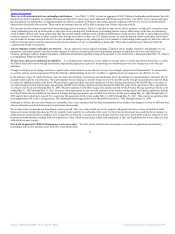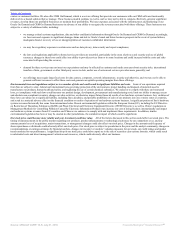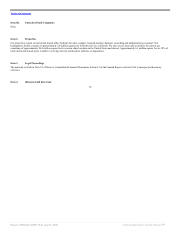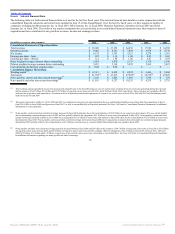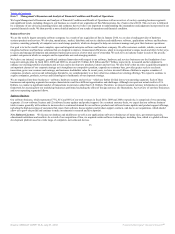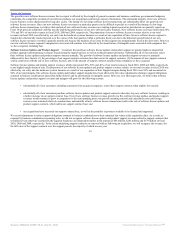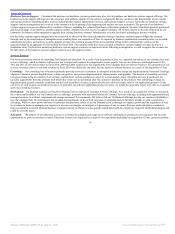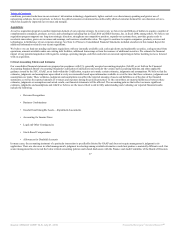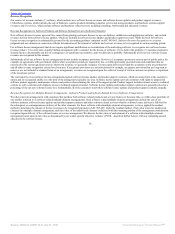Oracle 2009 Annual Report Download - page 32
Download and view the complete annual report
Please find page 32 of the 2009 Oracle annual report below. You can navigate through the pages in the report by either clicking on the pages listed below, or by using the keyword search tool below to find specific information within the annual report.
Table of Contents
centers or customer facilities. We also offer CRM On Demand, which is a service offering that provides our customers with our CRM software functionality
delivered via a hosted solution that we manage. These business models continue to evolve, and we may not be able to compete effectively, generate significant
revenues, develop them into profitable businesses or maintain their profitability. We incur expenses associated with the infrastructures and marketing of our
Oracle On Demand and CRM On Demand businesses in advance of our ability to recognize the revenues associated with these offerings. These businesses are
subject to a variety of additional risks, including:
• we manage critical customer applications, data and other confidential information through Oracle On Demand and CRM On Demand; accordingly,
we face increased exposure to significant damage claims and risk to Oracle’s brand and future business prospects in the event of system failures,
inadequate disaster recovery or loss or misappropriation of customer confidential information;
• we may face regulatory exposure in certain areas such as data privacy, data security and export compliance;
• the laws and regulations applicable to hosted service providers are unsettled, particularly in the areas of privacy and security and use of global
resources; changes in these laws could affect our ability to provide services from or to some locations and could increase both the costs and risks
associated with providing the services;
• demand for these services may not meet our expectations and may be affected by customer and media concerns about security risks, international
transfers of data, government or other third-party access to data, and/or use of outsourced services providers more generally; and
• our offerings may require large fixed costs for data centers, computers, network infrastructure, security and otherwise, and we may not be able to
generate sufficient revenues to offset these costs and generate acceptable operating margins from these offerings.
Environmental laws and regulations subject us to a number of risks and could result in significant liabilities and costs. Some of our operations acquired
from Sun are subject to state, federal and international laws governing protection of the environment, proper handling and disposal of materials used to
manufacture our products, human health and safety, and regulating the use of certain chemical substances. We endeavor to comply with these environmental
laws, yet compliance with such laws could increase our product design, development, procurement and manufacturing costs, limit our ability to manage excess
and obsolete non-compliant inventory, change our sales activities, or otherwise impact future financial results of our hardware systems business. Any violation of
these laws can subject us to significant liability, including fines, penalties, and possible prohibition of sales of our products into one or more states or countries,
and result in a material adverse effect on the financial condition or results of operation of our hardware systems business. A significant portion of Sun’s hardware
systems revenues historically has come from international sales. Recent environmental legislation within the European Union (EU), including the EU Directive
on Restriction of Hazardous Substances (RoHS) and Waste Electrical and Electronic Equipment Directive (WEEE Directive), as well as China’s regulation on
Management Methods for Controlling Pollution Caused by Electronic Information Products may increase our cost of doing business internationally and impact
our hardware systems revenues from EU countries and China as we endeavor to comply with and implement these requirements. In addition, similar
environmental legislation has been or may be enacted in other jurisdictions, the cumulative impact of which could be significant.
Our stock price could become more volatile and your investment could lose value. All of the factors discussed in this section could affect our stock price. The
timing of announcements in the public market regarding new products, product enhancements or technological advances by our competitors or us, and any
announcements by us of acquisitions, major transactions, or management changes could also affect our stock price. Changes in the amounts and frequency of
share repurchases or dividends could adversely affect our stock price. Our stock price is subject to speculation in the press and the analyst community, changes in
recommendations or earnings estimates by financial analysts, changes in investors’ or analysts’ valuation measures for our stock, our credit ratings and market
trends unrelated to our performance. A significant drop in our stock price could also expose us to the risk of securities class actions lawsuits, which could result
in substantial costs and divert management’s attention and resources, which could adversely affect our business.
28
Source: ORACLE CORP, 10-K, July 01, 2010 Powered by Morningstar® Document Research℠


